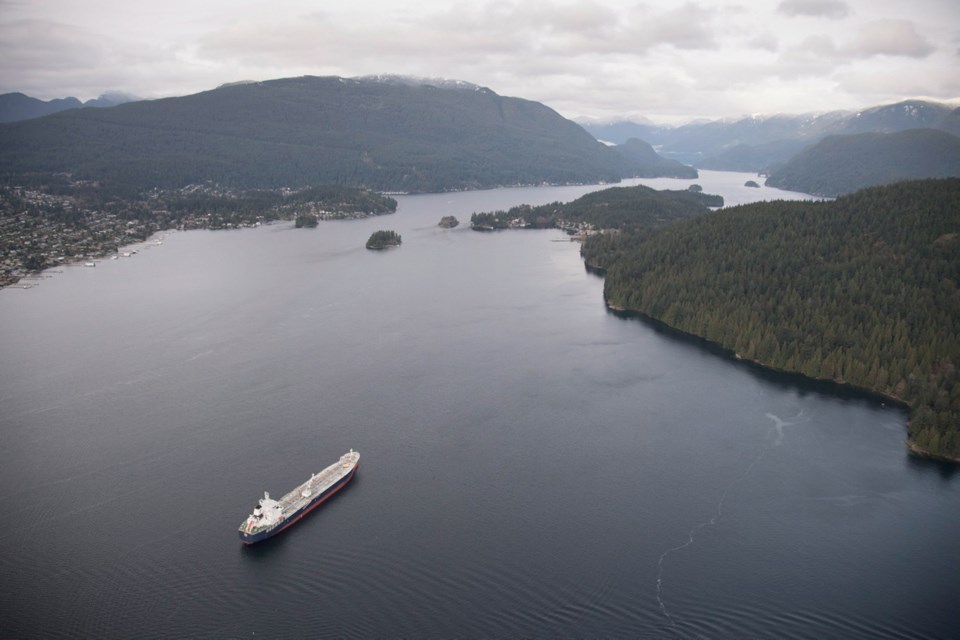A group of engineers is asking the province to delay its decision on Kinder Morgan’s Trans Mountain pipeline expansion project, warning that not enough is known about the risk of a tanker collision.
Its concern was echoed by a former federal environment minister, who said the project could be vulnerable to legal claims that the federal government’s environmental assessment was inadequate.
Brian Gunn, Campbell River-based spokesman for Concerned Professional Engineers, said it’s possible for a tanker’s rudder to fail, causing it to take out two bridges in Burrard Inlet. But the risk of vessel collisions with those bridges hasn’t been properly studied, he said.
The organization wrote an open letter to Premier Christy Clark this week, outlining its concerns.
“We’re saying we’ve looked at all of their risk analysis and simulations and so on — and it’s not fine,” he said.
“What we want is a proper risk assessment of the bridges to be carried out in a transparent way. And then people can know what that risk is and decide if that’s acceptable. That’s what the government has not done, when it approved the decision. They have not done a proper scientific analysis.”
The B.C. Transportation Ministry has a vessel-impact protection review underway, chief engineer Dirk Nyland told Concerned Professional Engineers in a letter. But the process, launched in response to increasing tanker traffic, won’t be complete until spring 2017.
Just because an accident hasn’t happened doesn’t mean one won’t, Gunn said. Westshore Terminals went without major incident for 42 years before a vessel ran into a berth’s approach conveyor in 2012, spilling coal into the sea.
Concerned Professional Engineers is not against pipelines, as they are safer than rail transport, Gunn said. But he said Westridge Marine Terminal in Burnaby is not the safest port for Trans Mountain’s products, pointing to Roberts Bank in Delta as an alternative.
“We’re professional engineers and we’re saying: We know this is not safe. So we’re trying to speak up, as our code requires,” Gunn said.
David Anderson, a former Liberal MP for Victoria, said the project’s approval could be overturned in court.
But while many observers have their eyes on First Nations who say they weren’t adequately consulted — which is the basis on which approval for Enbridge’s Northern Gateway project was overturned — there’s also an environmental argument to be made, he said.
Anderson said the federal government failed in its duty to minimize the risk of a spill by not studying alternative ports, such as Roberts Banks, adequately.
“The big failure of this whole process is they did not consider alternatives to Burnaby,” Anderson said.
Although Environment and Climate Change Canada estimated upstream greenhouse-gas emissions at 20 to 26 megatonnes of carbon-dioxide equivalent every year, Anderson said climate-change impacts weren’t adequately reviewed in the National Energy Board’s review of the project.
In 1971, Anderson participated in a lawsuit against the Alaska pipeline, successfully arguing that it failed to adequately assess environmental impacts on the Canadian coast.
Before Kinder Morgan settled on Westridge as a port, the company said it conducted a feasibility study and screening-level assessment of Roberts Bank, based on desktop studies of technical, economic and environmental considerations.
It found that diverting the pipeline to Roberts Bank would result in significantly greater cost and a larger footprint. The area also supports fish species, eelgrass beds and mud flats.
“We evaluated a number of potential marine locations on the West Coast, including Roberts Bank, and concluded that expansion of the existing terminal at Westridge is the best option. It is the safest location that will also result in the least environmental impact,” the company said.
Kinder Morgan said there’s a long record of tankers safely using Westridge Marine Terminal to transport the same oil products proposed under its plan.
“Today, Aframax-sized vessels, or smaller, call at our terminal and the same vessels will continue to transport the same product post-expansion,” the company said.
Port, pilotage and federal rules require that laden tankers leaving Westridge are piloted by two licensed marine pilots and escorted at slow speed by three tethered tugs.
Trans Mountain’s hazard assessment, conducted by consulting firm Det Norske Veritas, included an examination of the transit through Second Narrows — the area that worries the Concerned Professional Engineers, it said.



